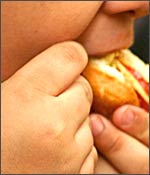|
|
| Help | |
| You are here: Rediff Home » India » Get Ahead » Living » Parenting |
|
 | ||
| |||||||||||||||||||||||
|
| |||||||||||||||||||||||
Many of us live with the myth that plump children are healthy children. And so we indulge our kids with food -- lots of it.
Sure, they look cute and have nice fat cheeks to pinch, but is it really healthy?
Mihika Sengupta*, homemaker and mother of 6-year-old Mahen, tells us how she dealt with this misconception. "I would never say 'no' to my child. He got whatever he wanted, be it chocolates, chips or fizzy drinks." Her in-laws believed that the amount of desi ghee served to the child is directly proportional to their love!
At five years of age, Mahen weighed 20 kg (a 5/6-year old usually weighs about 18 kg) and was called "fatso" by his friends. To make matters worse, he grew lethargic, did not enjoy outdoor activity and was perennially eating.
Mihika immediately started taking steps to change Mahen's lifestyle -- before it was too late.
* name changed to protect identity
Part II: A diet/activity plan for obese children
Obesity, a disorder?
According to reports, obesity in children is likely to be one of the biggest problems confronting parents in the next five years. According to a World health Organisation report, heart disease in children due to obesity is likely to be one of the biggest killers by 2015.
Obesity is bad news. Whether in adults or children.
"The extra fat puts a strain on the heart, kidneys and liver as well as on large weight bearing joints such as the hips, knees and ankles. This ultimately shortens the life span," says Dr Shobha Rao, a nutritional expert and the head of the Biometry and Nutrition Department, Agharkar Research Institute, Pune.
In obese children, the fat overloads the body metabolism, resulting in atherosclerosis (deposition of cholesterol in blood vessels) resulting in high blood pressure, diabetes mellitus and heart diseases.
Almost 80 per cent of obese children are likely to be obese adults; this could have serious repercussions on their health.
Obesity is very difficult to treat, since it involves permanently changing basic eating and exercise habits. There is no quick fix. Hence prevention is the best form of intervention, making it necessary to tackle obesity at an early level.
If you are concerned about your child, then you need to first figure out whether or not your child is obese.
Is your child obese?
"When a person weighs more than 20 per cent of the ideal body weight, we can call him/her obese," says Dr Sheila Bhave, a consultant in pediatric research at the KEM Hospital, Pune.
As per the Indian Council of Medical Research's criterion, obesity for Indians is defined according to the Body Mass Index, which is calculated on the basis of height and weight.
It is the body weight (in kg) divided by the square of the height (in metres). The normal value for this index is 18.5-25.
A BMI between 25-30 signifies ''overweight'' which adversely affects health with advancing age.
A BMI higher than 30 distinctly suggests obesity'.
The BMI is mostly used for adolescents and adults. Though there is no standard formula for pre-school obesity, your pediatrician will give you a clear indication, by calculating your child's body weight, height and body measurements.
Causes of obesity in children
Genetics
The primary reason for obesity could be genetic. The risk of becoming obese is greatest among children who have two obese parents.
Hypothyroidism
This is a condition due to decreased activity of the thyroid gland and its failure to produce adequate quantities of thyroid hormone. It leads to certain neurological problems and can also cause obesity.
Parental role models
Another reason could be the habits of the parents. Do they eat junk food? Do they eat all the time? Do they indulge in any physical activity? "The parental model of, both, eating habits and physical activities is crucial," says Dr Rao. Children emulate parents and this includes in eating habits and activities.
A sedentary lifestyle
The cut-throat competition for admissions/academic excellence have forced children to attend various tuition classes, leaving little or no time for physical activity.
Besides, with less stress on out door activities and sports, and rapid urbanisation, there is a dearth of open spaces and playgrounds for children.
Television watching and computer and video games is becoming an addiction, contributing to this.
Unhealthy eating habits
Children are often exposed to unhealthy eating patterns. This includes high calorie snacks, the junk food revolution, chocolates, which are often offered as rewards for 'good behaviour'.
Often when there is less time to cook, we whip up a quick meal at the risk of serving junk/fast food. This is okay once in a while but not on a daily basis.
Emotional factors
There are certain psychological factors like boredom, sadness and anger that can also influence eating habits.
Part II: A diet/activity plan for obese children
Is your child overweight? Do you have healthy diet tips/recipe ideas to share with other parents? Post your tips and experiences
DON'T MISS!
Are you an overprotective parent?
Does your child believe in God?
Should you have a second child?
|
|
| © 2008 Rediff.com India Limited. All Rights Reserved. Disclaimer | Feedback |